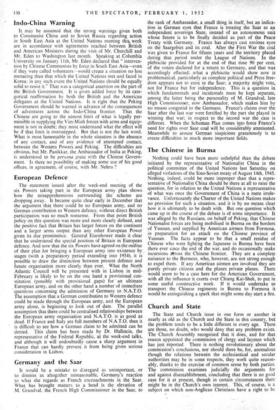Germany and the Saar
It would be a mistake to d:sregard as unimportant, or to dismiss as altogether unreasonable, Germany's reaction to what she regards as French encroachments in the Saar. What has brought matters to a head is the elevation of M. Grandval, the French High Commissioner in the Saar, to the rank of Ambassador, a small thing in itself, but an indica- tion in German eyes that France is treating the Saar as an independent sovereign State, instead of an autonomous unit whose future is to be finally decided as part of the Peace Treaty with Germany. France has always cast envious eyes on the Saargebiet and its coal. After the First War the coal was given to France for fifteen years and the territory placed during that period under the League of Nations. In the plebiscite provided for at the end of that time 90 per cent. of the voters declared for a return to Germany, and that was accordingly effected; .what a plebiscite would show now is problematical, particularly as complete political and Press free- dom appears not to exist in the Saar; a majority might -vote, not for France but for independence. This is a question in which fundamentals and incidentals must be kept separate, among the latter being the personality of M. Grandval, late High Commissioner, now Ambassador, which makes him by no means congenial to the Germans. France's claims over the Saar after the last war were fortified by the part she played in winning that war; in respect to the second war the case is different. When the Schuman Plan comes into force France's need- for rights over Saar coal will be considerably attennated. Meanwhile to arouse -German suspicions gratuitously is to create difficulties in much more important fields.


































 Previous page
Previous page